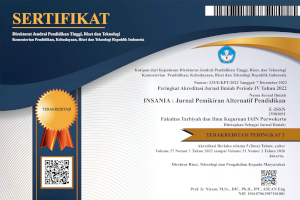Memahami Ideologi Pendidikan Dalam Perspektif Al – Qur’an
Memahami Ideologi Pendidikan Dalam Perspektif Al – Qur’an
DOI:
https://doi.org/10.24090/insania.v22i1.1174Keywords:
Ideology, Al - Qur'an, Education, IslamAbstract
Theoretically ideology is the theoretical foundation and philosophical view that provides operational direction. In its development there are current of three major ideology that influence education, namely: conservative, liberal, and critical. Traditional education systems tend to use conservative ideology as the basis for their education. Meanwhile, modern education that is currently growing rapidly in the pace of globalization is guided by liberacy the education management by carrying the spirit of high humanism. On the other hand, Islam as a religious building that carries the concept of rahmatan lil 'alamin basically has the concept of humanist value that is actually available in the Qur'an. It's just how humans can dig up and maximize their use in educational studies appropriately and to achieve the ideal educational concept needs to be developed more broadly. Thus, the concept or ideology of Islamic education actually already exists in the Qur'an and how human can maximize their potential to explore these sciences.Downloads
References
Bagus, Lorens. 2002. Kamus Filsafat. Jakarta: OT Gramedia
Baidlawi, Moh. Modernisasi Pendidikan Islam, dalam Jurnal Tadris Volume 1 Nomor 2006
Budiman, nasir. 2016. Ideologi Pendidikan Qur’ani: Gagasan dan Tawaran. Banda Aceh: Bandar Publishing
Hatta, Mohammad. 2000. Sosialisme Religius: Suatu Jalan Keempat. Yogyakarta: Kreasi Wacana.
Kertanegara, Mulyadhi. 2003. Menyibak Tirai Kejahilan: Pengantar Epistemologi Islam. Bandung: Mizan.
Kurniawan, M. Ardi. Peluang Penggunaan Paradigma Pendidikan Kritis dalam Kajian Bahasa dan Sastra, dalam Materi Pertemuan Ilmiah Bahasa dan Sastra Indonesia (PIBSI) XXXVI Tahun 2014.
Downloads
Published
How to Cite
Issue
Section
License
Authors who publish with this journal agree to the following terms:
Authors retain copyright and grant the journal right of first publication with the work simultaneously licensed under a Creative CommonsAttribution-ShareAlike License that allows others to share the work with an acknowledgment of the work's authorship and initial publication in this journal.
Authors are able to enter into separate, additional contractual arrangements for the non-exclusive distribution of the journal's published version of the work (e.g., post it to an institutional repository or publish it in a book), with an acknowledgment of its initial publication in this journal.
Authors are permitted and encouraged to post their work online (e.g., in institutional repositories or on their website) prior to and during the submission process, as it can lead to productive exchanges, as well as earlier and greater citation of published work (See The Effect of Open Access).








